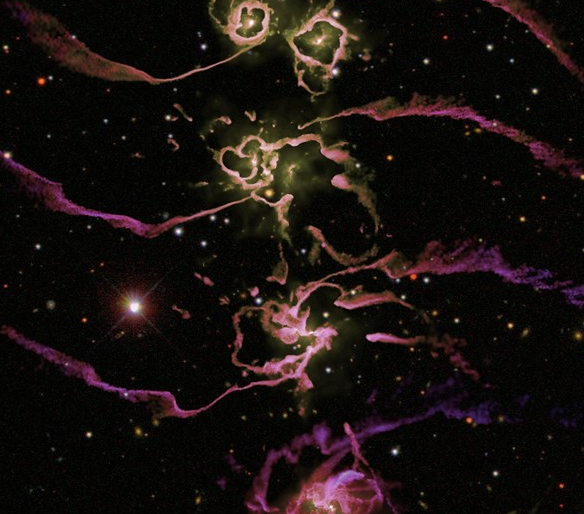GADGET – Code

GADGET is a freely available code for cosmological N-body/SPH simulations on massively parallel computers with distributed memory. GADGET uses an explicit communication model that is implemented with the standardized MPI communication interface. The code can be run on essentially all supercomputer systems presently in use, including clusters of workstations or individual PCs.
GADGET computes gravitational forces with a hierarchical tree algorithm (optionally in combination with a particle-mesh scheme for long-range gravitational forces) and represents fluids by means of smoothed particle hydrodynamics (SPH). The code can be used for studies of isolated systems, or for simulations that include the cosmological expansion of space, both with or without periodic boundary conditions. In all these types of simulations, GADGET follows the evolution of a self-gravitating collisionless N-body system, and allows gas dynamics to be optionally included. Both the force computation and the time stepping of GADGET are fully adaptive, with a dynamic range which is, in principle, unlimited.
GADGET can therefore be used to address a wide array of astrophysically interesting problems, ranging from colliding and merging galaxies, to the formation of large-scale structure in the Universe. With the inclusion of additional physical processes such as radiative cooling and heating, GADGET can also be used to study the dynamics of the gaseous intergalactic medium, or to address star formation and its regulation by feedback processes.
The code can be downloaded at the
The principal references for the code are the papers:
- The cosmological simulation code GADGET-2
Springel V. (2005)
Monthly Notices of the Royal Astronomical Society, 364, 1105 [ADS] - GADGET: a code for collisionless and gasdynamical cosmological simulations
Springel V., Yoshida N., White S. D. M. (2001)
New Astronomy, 6, 79 [ADS]
Über das HITS
Das HITS (Heidelberger Institut für Theoretische Studien) wurde 2010 von dem Physiker und SAP-Mitbegründer Klaus Tschira (1940-2015) und der Klaus Tschira Stiftung als privates, gemeinnütziges Forschungsinstitut gegründet. Es betreibt Grundlagenforschung in den Naturwissenschaften, der Mathematik und der Informatik. Zu den Hauptforschungsrichtungen zählen komplexe Simulationen auf verschiedenen Skalen, Datenwissenschaft und -analyse sowie die Entwicklung rechnergestützter Tools für die Forschung. Die Anwendungsfelder reichen von der Molekularbiologie bis zur Astrophysik. Ein wesentliches Merkmal des Instituts ist die Interdisziplinarität, die in zahlreichen gruppen- und disziplinübergreifenden Projekten umgesetzt wird. Die Grundfinanzierung des HITS wird von der Klaus Tschira Stiftung bereitgestellt.